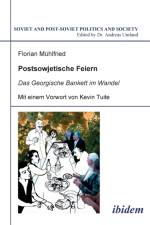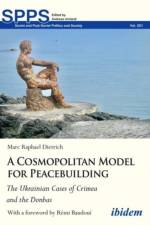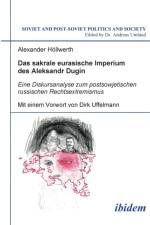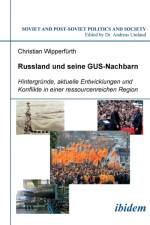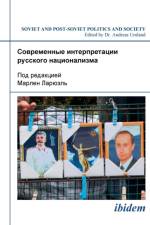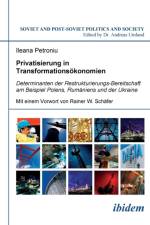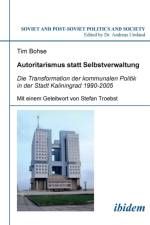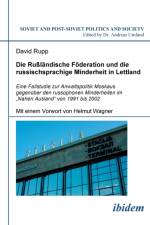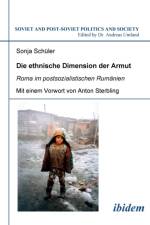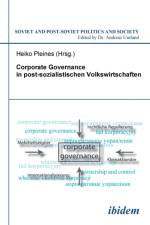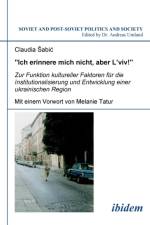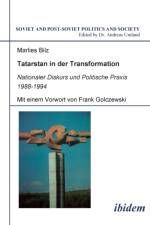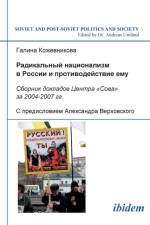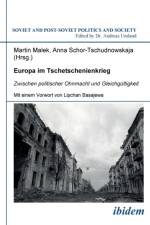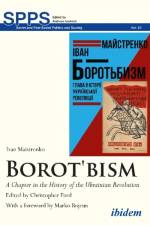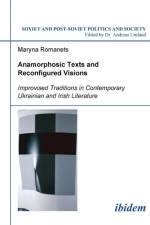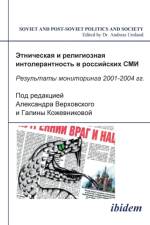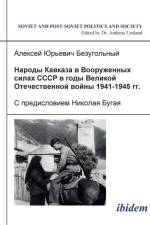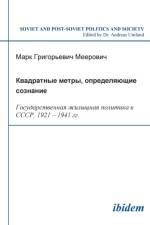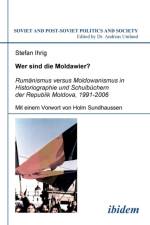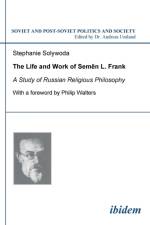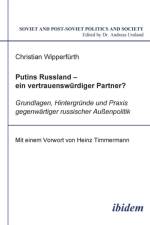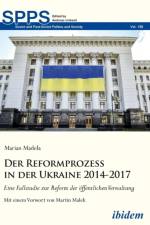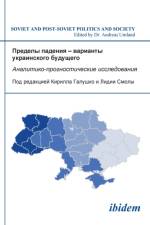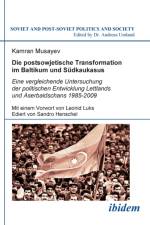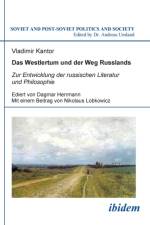Bøger i Soviet and Post-Soviet Politics and Society serien
-
- Bog
- 494,95 kr.
-
493,95 kr. Ukraine is again-since its annexation of Crimea in February 2014 and the ongoing war in the Donbass-the stage of the largest crisis in Europe since the end of the Cold War. When it comes to understanding the resolution and prevention of complex hybrid conflicts, theories in international relations are trapped in their state-centered perspectives. Meanwhile, the role of the individual actor, alone or organized, often remains underestimated as political and moral agent. In this book, Marc Raphael Dietrich sheds light on a critical yet politically practicable notion of cosmopolitanism which centers on the individual and is framed by a set of universal principles, thus providing valuable alternative insights on the Crimea and Donbas conflict.
- Bog
- 493,95 kr.
-
- Bog
- 1.095,95 kr.
-
- Bog
- 560,95 kr.
-
650,95 kr. The Russian nationalist idea, considered a marginal tendency in the 1990s, has, during the last years, transformed into an official state and widely popular ideology. The Russian political spectrum is unified in its promotion of a discourse grounded in undisguised anti-Westernism as well as the paranoid view that national unity and authenticity are threatened by various external and internal enemies. The space of political representation has become increasingly covered by nationalism to the point that it is today regarded a "politically correct" attitude in Russia. Nationalist and, in some cases, crypto-fascist factions operate in all major political parties of Russia today.The government actively contributes to promoting this trend through introducing patriotic education at school, revitalizing anti-Americanism as a foreign policy doctrine, new national holidays and commemorations, a growing cult of the military, frequent references to Orthodoxy, utilizing ultra-nationalist groupings in its manipulation of public life through "political technology", and essentializing "ethnic rights" of the national subjects of the Federation. The media has come to play a crucial role in the dissemination of cryptic and, sometimes, manifestly nationalist ideas. The submission of most major mass media outlets to the authorities highlights the "fourth power's" status as a proponent of nationalist discourse in its own right. The media has been playing an increasing role in exacerbating xenophobic tensions within Russian society.This nationalist climate is not restricted to politics and journalism, but is also to be found in numerous sections of cultural and academic life. Thus, in Russia today, apart from various cases of para-science and alternative history, the notion that certain academic disciplines have the mission to justify "Russian specificity" is widespread among scholars, as are approaches, defined as "civilizationist," that systematize national stereotypes. History, sociology, economics, and literature as well as the new disciplines of "culturology" and "geopolitics" propagate ethnocentric precepts with consequences yet to be explored.Contents:Marlène Laruelle, Deliberations on "Russian Nationalism" as a Subject of Academic Research; Galina Zvereva, The Discourse of the State Nation in Contemporary Russia; Viktor Voronkov and Oksana Karpenko, Patriotism as Nationalism of the (Post-)Soviet Man; Andreas Umland, Three Varieties of Post-Soviet Fascism: Conceptual and Contextual Problems of Interpreting Contemporary Russian Ultra-Nationalism; Aleksandr Verkhovskii, The Church's Project of Russian Identity; Dmitrii Dubrovski, Sports and Politics: Soccer as a National Idea in Contemporary Russia; Viktor Shnirelman, The Civilizational Approach as National Idea; Aleksandr Nikulin and Irina Totsuk, The Metahistorical Matrix of Great Power Rent-Seeking: Politico-Economic Peculiarities of the Academic National Idea; Natalia Ivanova, Specificities of the Nationalist Discourse in Contemporary Literary Criticism; Yulia Liderman, The Course towards Patriotism and the Answer of Russian Cinematography after 2000: New Budgets, New Genres, New War Movies; Vera Zvereva, TV Celebration Concerts: The Rhetoric of State Nationalism.
- Bog
- 650,95 kr.
-
- Bog
- 739,95 kr.
-
- Bog
- 560,95 kr.
-
- Bog
- 471,95 kr.
-
- Bog
- 560,95 kr.
-
- Bog
- 560,95 kr.
-
- Bog
- 560,95 kr.
-
- Bog
- 739,95 kr.
-
- Bog
- 739,95 kr.
-
- Bog
- 650,95 kr.
-
- Bog
- 427,95 kr.
-
- Bog
- 917,95 kr.
-
423,95 kr. Much has been written on the 1917¿1920 revolution in Ukraine, on the national movement, the Makhnovists and the Bolsheviks. Yet there were others with a mass following whose role has faded from history books. One such party was the Borotbisty, the heirs of the mass Ukrainian Party of Socialist-Revolutionaries, an independent party seeking to achieve national liberation and social emancipation. Though widely known in revolutionary Europe in their day, the Borotbisty were decimated during the Stalinist holocaust in Ukraine. Out of print for over half a century, this lost text by Ivan Maistrenko, the last survivor of the Borotbisty, provides a unique account on this party and its historical role. Part memoir and part history, this is a thought-provoking book which challenges previous approaches to the revolution and shows how events in Ukraine decided the fate not only of the Russian Revolution but the upheavals in Europe at the time.
- Bog
- 423,95 kr.
-
- Bog
- 650,95 kr.
-
560,95 kr. This book represents a collection of the results of four empirical studies of ethnic and religious hate speech in Russia in 2001-2004. Several Russian non-governmental organizations took part in the project. The major part of the research was done by Alexander Verkhovsky and Galina Kozhevnikova (Sova Center). Further contributions were made by Tatyana Lokshina and Sergey Lukashevsky (formerly, Moscow Helsinki Group; now Demos Center) and Ksenya Izotova and Valeriya Akhmetyeva (Sova Center).The contributions analyze and compare with each other dynamics of the development of hate speech according to such parameters as groups that are the objects of intolerance, permutations of hate speech, types of people who voice intolerant views, etc. These phenomena were studied in politically relatively calm periods as well as in times of raising intolerance after the terrorist acts in Moscow 2002 and Beslan in 2004. Special research was devoted to hate speech during the federal electoral campaigns of late 2003 - early 2004. This allows the authors to make some conclusions about the dependence of hate speech on events such as the above.
- Bog
- 560,95 kr.
-
- Bog
- 650,95 kr.
-
560,95 kr. This book discusses a number of issues concerning the service of the nationalities of the Caucasus in the Red Army within the context of Soviet nationality policies and an intensification of repressive tendencies in the USSR's armed forces during World War II. It is the first study of the role and function of the Caucasian national troops in the Red Army and of related political debates between state and military leaders of the Caucasian national republics and USSR. The political aspects of the mobilization of various Caucasian nationalities in the army, and the reasons for the gradual cessation, in the course of 1941-1943, of the mobilization in the Red Army of all native nationalities of the Northern and Southern Caucasus are analyzed, in particular.The study is based on documents from the Central Archive of the Defense Ministry of the Russian Federation, Russian State Archive of Social and Political History and Russian State War Archive, as well as on various memoirs and secondary sources.
- Bog
- 560,95 kr.
-
- Gosudarstvennaia zhilishchnaia politika v SSSR. 1921-1941 gg.. Square Meters Determining Consciousness: State Housing Policies in the USSR, 1921-1941
427,95 kr. Based on extensive archival research and, in particular, on documents of the Central Committee of the VKP(b), TsIK and SNK of the USSR and RSFSR, VSNKh, NKVD, and other institutions, this book analyses the aims and methods of pre-World War II urban housing policies in the Soviet Union. Among the issues covered are the principles of the Soviet approach to private and communal housing, the role of the state security organs in the administration and distribution of accommodation, different types of early Soviet lodging (communal houses, family flats, Soviet Houses and Hotels, etc.), the reasons for the abandonment of cooperative housing as well as for the restrictions on building private cottages, and the role of housing for enforcing certain types of behaviour and labour desired by the Soviet government. The study, for the first time in Russian language, describes in some detail the so-called New Housing Policy largely ignored in Soviet historiography.
- Bog
- 427,95 kr.
-
- Bog
- 650,95 kr.
-
- Bog
- 471,95 kr.
-
- Bog
- 471,95 kr.
-
650,95 kr. Diese Monographie stellt eine tiefgehende Fallstudie des 2014 begonnenen Reformprozesses in der Ukraine dar. Sie diskutiert sowohl die politisch-ökonomischen Rahmenbedingungen als auch die vielfältigen Hindernisse, welche die angelaufene tiefgehende Umgestaltung von Staat, Wirtschaft und Gesellschaft der Ukraine erschweren. Neben den Grundlagen der Transformation in Osteuropa und Ursachen für das Ausbleiben einer umfassenden Modernisierung der Ukraine vor 2014 steht die Umsetzung der Reformen seither im Mittelpunkt. Hierzu wird eine Reihe von Reformagenden aus verschiedenen Blickwinkeln diskutiert und mit den bisherigen Ergebnissen abgeglichen. Besonderes Augenmerk liegt auch auf den Anliegen der Zivilgesellschaft sowie Forderungen internationaler Akteure. So werden ¿ vier Jahre nach dem Euromaidan ¿ Erfolge und Rückschläge in den zentralen Politikfeldern nachvollziehbar. Die Untersuchung vermittelt nicht nur einen Eindruck von der Komplexität und Langfristigkeit der Transformationsprozesse. Sie ordnet auch die bisherigen Ergebnisse der Reformbemühungen in ein Gesamtbild ein und erklärt den jeweils spezifisch ukrainischen Kontext. Kernbeitrag ist eine datenbasierte Analyse der ersten Phase der begonnenen Neuformierung der öffentlichen Verwaltung, anhand derer die Schwierigkeiten einer Umsetzung weitreichender Modernisierungsvorhaben illustriert werden. Das Buch ist die erste derartige längere Studie in deutscher Sprache. Sie wendet sich in erster Linie an Entscheidungsträger, Journalisten und Forscher, die sich ein genaueres Bild über den Stand des ukrainischen Reformprozesses machen und die Ursachen für dessen oft unvorhersehbaren Verlauf besser verstehen wollen.
- Bog
- 650,95 kr.
-
650,95 kr. Russische Publizisten und Wissenschaftler befassen sich seit jeher mit der Frage nach der kulturellen und politischen Selbstdefinition und dem Entwicklungspfad ihres Landes. Diese Diskurse wurden bereits vor der Sowjetzeit ausgetragen, schwelten in der UdSSR unter der Oberfläche weiter und traten mit Glasnost' wieder offen zutage. Denn zum einen waren die Gorbatschow- und Jelzin-Ära, die in der Presse oftmals als eine neue "Zeit der Wirren" beschrieben wurden, von weitgehenden bürgerlichen Freiheiten gekennzeichnet. Zum anderen zog das Chaos in dieser Periode einen tiefen Identitätsverlust nach sich, der den Boden für Kontroversen um eine politische Neuorientierung bereitete.Eva Zabka ordnet und interpretiert in ihrer Studie die Debatten, die in der Liberalisierungs- und Demokratisierungsphase zwischen 1985 und 2000 in den sowjetischen und russischen Printmedien geführt wurden. Die Eigentümlichkeit der russischen Standpunkte zum Systemwandel fand in der internationalen politologischen Forschung bisher wenig Beachtung. Daher wurden in der vorliegenden Diskursanalyse zahlreiche Textbeispiele aus Zeitungen, Zeitschriften und aus wissenschaftlichen Publikationen näher untersucht. Dabei lag ein Schwerpunkt auf den Kontinuitäten und Veränderungen in den medialen Auseinandersetzungen. So wurden Stereotype und tradierte Denkschemata aufgedeckt, die in den Diskursen dominierten. Ein besonderes Augenmerk galt ferner den Regimebezeichnungen der russischen Publizisten, die in kreativer Weise das Schwanken des Landes zwischen Demokratie und Autoritarismus auf den Punkt brachten.
- Bog
- 650,95 kr.
-
560,95 kr. Ukraine of the last years has been an unpredictable country. The frequent changes of government and parliamentary coalitions as well as the contradictory foreign policy orientations of the main political actors and the switching between different modes of international integration - how can one predict the future of such a state? Are there any constants and long-term trends?The following collected volume is an excerpt from a broader collective investigation of several Ukrainian scholars conducted in 2007-2008, and revised in accordance with the new realities of 2010. On the basis of an analysis of different spheres of society, the authors propose integrated scenarios of the nearest Ukrainian future: (1) a "realistic" (inert) one, (2) an "optimistic" one, and (3) a "pessimistic" one. The real development of the coming years may comprise elements of all three scenarios. Yet the reader will be able to follow certain constant tendencies - the deepening of the socio-demographic crisis, the politicians' continued ignoring of the social capital and resources of civil society, as well as a possible loss of sovereignty in Ukraine's relations to Russia. In the introduction, Galushko presents the approaches and concepts of the study. The chapter "The Main Problems and Tendencies of Socio-Economic Development" was written by a team of sociologists under the leadership of Smola. The attempts of "development by plan" and evolution of the information sphere of Ukraine are analyzed in separate contributions by Smola. Viktor Kotigorenko considers risks of ethnic conflicts while Evgenii Magda outlines the main tendencies of political development. Elena Titova deals with the problems of a preservation of the Ukrainian cultural heritage. In conclusion, integrated scenarios are formulated by Galushko in collaboration with Smola and Magda.
- Bog
- 560,95 kr.
-
- Bog
- 471,95 kr.
-
- Bog
- 739,95 kr.

